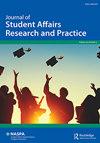我们为什么大声疾呼:在争取社会平等的同性恋运动中,性取向的先入为主的原因对异性交往的影响
IF 0.8
Q3 EDUCATION & EDUCATIONAL RESEARCH
Journal of Student Affairs Research and Practice
Pub Date : 2023-05-31
DOI:10.47611/jsrhs.v12i2.4243
引用次数: 0
摘要
尽管社会对同性恋个体的接受程度越来越高,但异性恋个体对同性恋的看法却受到个人偏见的污染。我的研究观察了422名异性恋者和同性恋者之间的互动。首先,我的研究对象自我报告了他们对性取向决定因素的信念(基因或生活方式)。接下来,他们以行动主义取向(AO)和性偏见(SP)量表作为衡量他们与同性恋群体成员关系的基准。实验对象被随机分配听两个虚构的同性恋者的采访,他们讲述的生活经历要么支持,要么与实验对象自我报告的信念相矛盾。此外,受试者被分配到对受访者的高或低同理心条件。在听完访谈后,受试者被要求选择拨出0 - 8000美元来支持一个支持LGBT的慈善机构。然后,研究对象重新使用AO和SP量表来测量虚构场景后对同性恋认知的显著变化。结果表明,观看与他们的信念相矛盾的采访的受试者的AO显着下降。此外,被分配到低同理心条件下的受试者捐赠的金额明显更多。目前的研究有两个主要的含义:异性恋个体基于单一同性恋者的行为来推广他们对LGBT群体的支持。此外,许多积极分子自然地从同理心的角度来处理社会正义问题,从逻辑的角度来处理社会正义运动,以允许更有意义和长期参与社会正义运动,这是更可持续的。本文章由计算机程序翻译,如有差异,请以英文原文为准。
Why We Speak Up: The Effect of Preconceived Cause of Sexual Orientation on Heterosexual Engagement in the Homosexual Movement for Social Equality
Despite the increasing societal acceptance of homosexual individuals, the perception of homosexuality by heterosexual individuals is polluted by personal bias. My study observed the interaction between 422 heterosexuals and the homosexual community. First, my subjects self reported their beliefs on the determinant of sexual orientation (genetic or lifestyle). Next, they took the Activism Orientation (AO) and Sexual Prejudice (SP) Scales as a baseline measure of their relationship with members homosexual community. Subjects were randomly assigned to listen to an interview of two fictional homosexual individuals that spoke of life experience which either supported or contradicted the subjects’ self reported beliefs. Additionally, subjects were assigned to a high or low empathy condition toward the interviewee. After listening to the interview, subjects were given the choice to allocate $0 - $8,000 in support of a pro - LGBT charity. Subjects then retook the AO and SP scales to measure for significant changes in perception of homsexuals after the fictional scenario. Results indicated a significant decrease in the AO of subjects that viewed interviews that contradicted their beliefs. Additionally, subjects assigned to the low empathy condition donated significantly larger amounts. The present study has two main implications: Heterosexual individuals’ generalize their advocacy toward the LGBT community based on the actions of a singular homosexual. Furthermore, many activists naturally approach issues regarding social justice from a place of empathy, it is more sustainable to approach social justice movements from a logical perspective to allow for more meaningful and long term participation in a social justice movement.
求助全文
通过发布文献求助,成功后即可免费获取论文全文。
去求助
来源期刊

Journal of Student Affairs Research and Practice
EDUCATION & EDUCATIONAL RESEARCH-
CiteScore
2.40
自引率
9.10%
发文量
50
期刊介绍:
The vision of the Journal of Student Affairs Research and Practice (JSARP) is to publish the most rigorous, relevant, and well-respected research and practice making a difference in student affairs practice. JSARP especially encourages manuscripts that are unconventional in nature and that engage in methodological and epistemological extensions that transcend the boundaries of traditional research inquiries.
 求助内容:
求助内容: 应助结果提醒方式:
应助结果提醒方式:


